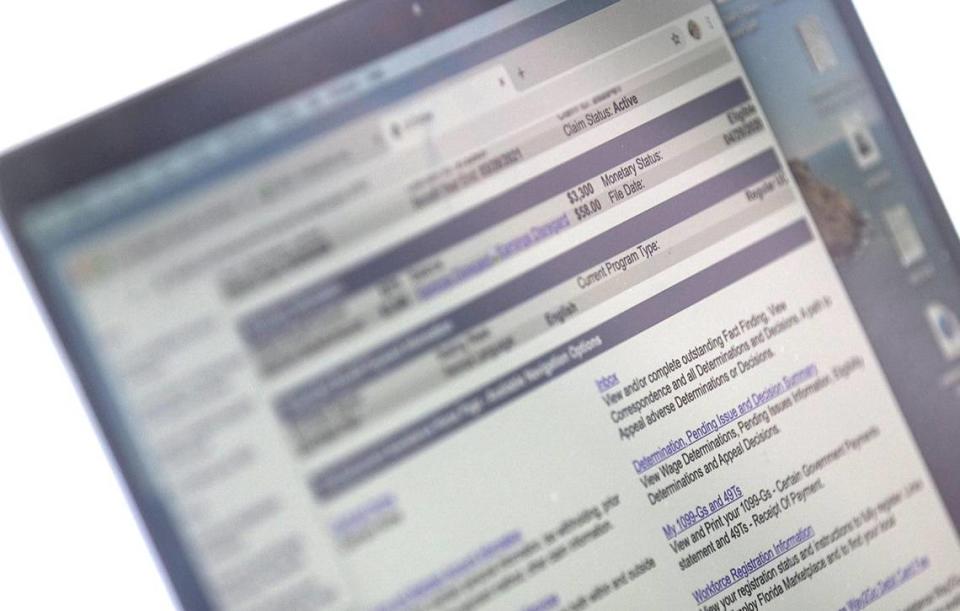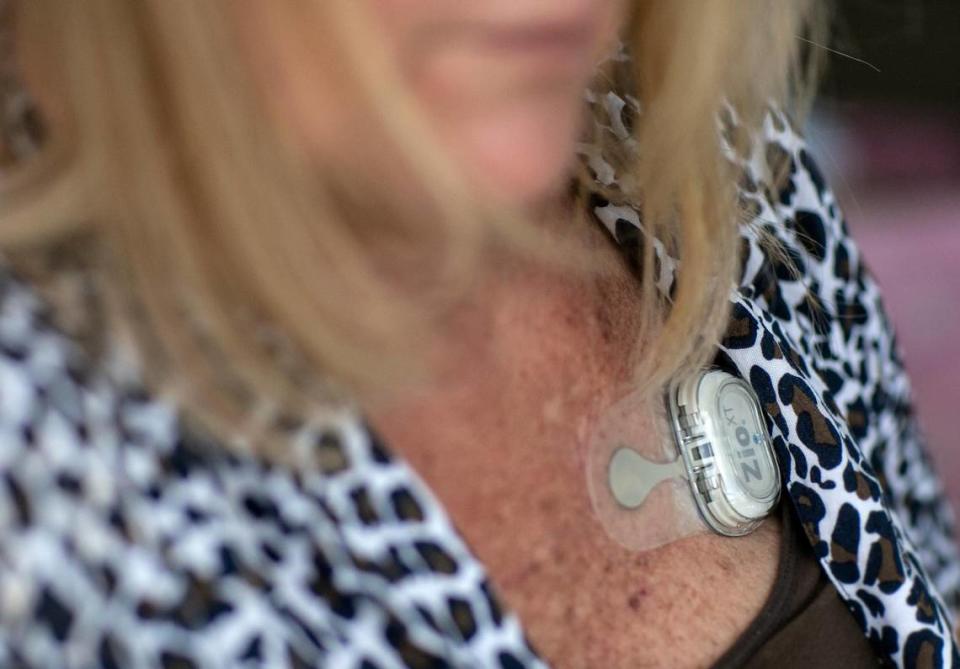Applying for unemployment became her full-time job. It almost drove her insane
Janice Bernstein lost her job, and then she lost her mind.
In the eight weeks since her workplace was shut down by coronavirus pandemic stay-at-home orders, she and almost 2 million Floridians have struggled to claim unemployment checks from the state agency funded by taxpayers for the purpose of providing aid in hard times. Even its name is a cruel taunt: Department of Economic Opportunity.
The department’s maniacal website seems designed to defeat even the most diligent applicant, such as Bernstein, who describes herself as a bulldog. After hundreds of phone calls, dozens of password resets, 100 emails and countless hours feeling like a rat in the department’s maze, Bernstein has yet to extract a penny from the state to pay her bills.
“It’s a full-time job,” Bernstein said. “I’m drained. I’m drained. The stress, the frustration, the anger. It’s an insane system and it’s driving me insane.”
Bernstein has been disconnected, put on hold, put on hold and disconnected, denied access to the site, booted off the site, accused of fraud, entered reams of information only to see it disappear, exchanged messages with supervisors who promise to help only to have them disappear. The CARES Act, CONNECT, reemployment services — who comes up with these terms as if they’re producing a black comedy, Bernstein asks.
There’s the PIN Catch-22. Applicants are asked to recall PINs from years ago or create a new one. But after three strikes, they’re locked out, must call or send an email and wait 24 hours for their PIN. Calling is no use; the understaffed agency is overwhelmed by calls. Applicants who start calling the second the office opens in the morning either get a busy signal or are sent into hold limbo for hours. Emails aren’t returned. It took Bernstein four weeks to get a PIN.
Had Dante entered the Department of Economic Opportunity portal, he would have made it the 10th circle of hell in “Inferno.”

“It’s a disgrace — the most soul-destroying process,” Bernstein said. “They make you think you’re mad. They’re playing a game with you. It’s like driving from Miami to Boca Raton by way of Key West. People have become desperate. If I didn’t have a sense of humor, and a wacky one, I would have gone over the edge by now.”
The reviled system has come to symbolize all that is broken, cheap, corrupt, trashy, absurd and boneheaded about Florida, the slowest state in the nation to process claims and the fifth stingiest with its $275 weekly payment for a maximum of 12 weeks, according to the U.S. Department of Labor. Florida’s unemployment rate has soared to 22 percent. The jobless toll nationwide has risen to 36 million.
Listen to today's top stories from the Miami Herald:
Applying for her $275, plus the $600 weekly payment from the federal government’s $2.2 trillion CARES emergency relief fund, which is disbursed by the state, has consumed Bernstein. She feels the strain of the daily fight. She was earning about $42,000 a year as a menswear sales associate at a department store in the Aventura Mall. Since immigrating from South Africa with her two children 10 years ago, she had built a loyal clientele and earned extra money through commissions. She enjoyed her job.
Now she counts Department of Economic Opportunity error messages in her sleep. When she can sleep.
“There’s not a night when I don’t wake up. I sit on the balcony and drink tea,” said Bernstein, 54, who lives in a modest North Miami Beach apartment. She currently shares it with her son, Adam, a Miami-Dade Public Schools teacher who is helping pay $1,600 rent and utility, insurance and grocery bills. “My shoulders and neck are stiff. Headaches. Shooting pains in my chest.”
Bernstein reluctantly went to the doctor Monday. She came home with an electrocardiogram monitor taped to her upper left chest. Diagnosis: Mitral valve prolapse that is causing heart palpitations. Bernstein has never had health problems before. She’s not only worried about her heart but the $750 deductible on her medical insurance.

“I’ve told the DEO I’m going to have a stroke,” she said. “They’re killing me.”
Bernstein has cried. She has paced. She has baked, and eaten too many muffins.
“I make a good mashed potato,” she said. “That’s an outlet.”
She has not destroyed anything. She has not flung her laptop into the canal. Yet. Instead, she curses at it, using foul vocabulary that erupts from her mouth uncontrollably.
“I’ve had screaming tirades. My son came running into the room, ‘Mom, what is going on?’” Bernstein said.
Bernstein’s agony stems from a system set up to fail, she said.
Gov. Ron DeSantis finally admitted that the antiquated, glitch-prone system is “a jalopy.” The website was built for $77 million during former governor Rick Scott’s administration by a contractor whose lobbyist was a campaign crony of Scott’s. Audits showed the system was malfunctioning and vulnerable to fraud.
U.S. Rep. Donna Shalala, who is collecting stories of futility from constituents, calls it “a disaster.” State Sen. Jose Javier Rodriguez said fewer than a third of qualified applicants receive benefits because the system was created “to limit the number of people who make it through; it’s like running the gauntlet.”
State Sen. Annette Taddeo terms the portal “a total failure” purposely designed to deflate jobless numbers to make Florida’s employment picture look prettier than it actually is.
The store where Bernstein worked closed March 16. She’s been battling for her unemployment benefits since.
First, the Sisyphean threshold obstacle. Once she completed the first page of the application online, she got kicked off. Had to start over from scratch. Nothing was saved. She had to make it to the fifth page to finish the first stage of the process. She’d get to page three on her eighth try. Bumped. Start over.
Her account was flagged for fraud. Turns out the fraud was from 2014 and 2015, when the system was breached and thousands of hackers stole money from the state. Somebody used Bernstein’s Social Security number to get at least $1,568 — but she was never informed until now. It took her three weeks to get the fraud confusion sorted out, including changing the address of the fraudster on her account to her real address.
When the unemployment website crashed, Bernstein resorted to the phone. The Department of Economic Opportunity line was usually busy. When she got through, after dialing dozens of times, she’d hear the automated message with menu choices, which led to another automated message with a different voice and more menu choices, then the warbly, warped music which only added to the annoyance.
Why can’t they play better music, she wondered? Then the music was interrupted by another message: “We are currently experiencing the highest volume of calls we’ve ever received.” She could leave a callback number. But they never called back.
Bernstein has the entire spiel memorized, even the phrases in Creole.
“Once you’ve actually got through and you’re on hold, you can’t hang up. It’s like the Hotel California. You can never leave,” she said. “Even when the music stops, that’s a trick, you haven’t been disconnected. You’ve got to wait for someone to answer.”
As Bernstein’s small nest egg shrank, she decided she needed department names. Instead of raging against a machine, she had to make it personal. She called the Miami Herald and got the name and email of a supervisor. Thus began another hunt, as she was passed to a succession of supervisors, all sympathetic, all leading to dead ends.
“My patience has come to an end and I need help,” she wrote on April 15. “I beg you to please help me.”
Each person Bernstein communicated with knew how to handle only a segment of her case, or said they’d refer her to someone who did. It was clear many were reading or writing from a script composed to calm anguished applicants.

“You talk to these people and they are sweet but they can’t solve your problem,” said Bernstein, who also mailed paper applications twice. “I’m like a chicken running around and they are patting me on the head saying, ‘There, there.’”
Bernstein kept blazing a path into the Department of Economic Opportunity’s parallel universe, where nothing makes sense.
“I came here with two children and two suitcases because I wanted to escape the crime of my native country and give my kids a good college education,” said Bernstein, who grew up in Capetown. “When I arrived, I was soft. I discovered that Florida is a scam state. Hashtag FloridaMorons is trending. You toughen up very quickly. I’ve learned to persevere. I won’t take no for an answer. Politicians should be held accountable for this mess.”
Bernstein has been in contact with her co-workers. Many have had their claims denied, with no explanation. She conducted a poll on her Instagram account: 76 percent of respondents said they have not collected any unemployment money. The true number of unemployed will never be tallied accurately because so many will abandon their attempts to file, she said.
“My message is don’t give up,” she said. “The system wants you to give up. Carry on and get what is rightfully yours.”
On Tuesday, a breakthrough. Bernstein received an email from one of the supervisors she’d corresponded with. He said her status had been upgraded from Pending to Active.
“They have been forced to acknowledge I exist,” she said. “I exist! I was beginning to wonder if I was a figment of my imagination.”
She was due to receive five weeks of payments, for a total of $4,375, the email said. She’d have to reapply for May. On Thursday, one $600 CARES payment was made via direct deposit. That’s it. She’s still waiting on what the Department of Economic Opportunity owes her.
Her muted reaction surprised her. She realized her struggle — and that of her fellow unemployed workers — isn’t just about the money but about the struggle itself, against a surreal, unjust system built to betray those who need it urgently.
“You’d think I’d be jumping for joy, but I’m jaded,” she said. “I won’t believe it until all the money is in the bank.”

